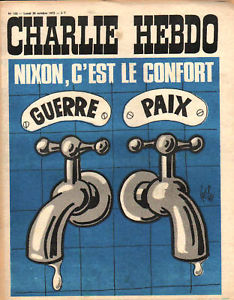Yes, the New Charlie Hebdo Cover is Offensive

Those who want to claim we are in the midst of a clash of civilisations have an easy time perpetuating their narrative. Just look at the very different responses to the new Charlie Hebdo cover. The cartoon shows the Prophet Mohammed weeping as he holds up a “Je suis Charlie” placard – with the words “All is forgiven” above the image.
Here’s what the cartoonist Renald Luzier says about the moment he conceived it:
I cried. And it was the front page. We had found the front page. We had at last found this damned front page. And it was our front page, not the one the world wanted us to do, but the one that we wanted to do. It wasn’t the front page that the terrorists wanted us to do, because there isn’t a terrorist in there. There’s just a man crying, a character crying. It’s Muhammad. I’m sorry, we drew him again, but the Muhammad we drew is a man crying, above all.
Most Western media have celebrated the cartoon in similar terms. A Guardian review of the new 1 million print-run edition called it “poignant”, “typically cheeky”, “ribald”, “classic” Charlie Hebdo. Reporting suggested that those western publications that didn’t publish the cover mostly refused to do so out of fear of threats to their staff.
The response in parts of the Muslim world was, of course, much less enthusiastic. In the Philippines, there were protests at which Hebdo posters were burnt, while clerics in leading Muslim countries denounced the cartoon. Turkey is trying to block access to the front cover on the internet.
What does this show? A battle to the death between secularism and religious belief, enlightenment and barbarism? That we have a civilised West that cherishes free speech pitted against a regressive East that enforces religious orthodoxy at the cost of individual liberty?
We certainly have a very polarised debate. But we should remember that we in the West are the ones framing the debate – and in a way that inevitably makes us look good, makes us the victims.
What we have instead, I suggest, is an entrenchment of prejudice and extremism on both sides, exacerbated by the confrontation itself. What appears to be an ideological conflict is more precisely a battle for control of the narrative. There is a context and a history that inflame these passions, one that concerns control of global resources in which the West does not look half as good as it thinks it does.
For me the Charlie Hebdo cover precisely embodies the very problem it thinks it exposes: not a clash of civilisations, but our desperation to control the narrative to our advantage. It is telling in my view that the cartoonist says he cried at the moment he came up with the idea. The cartoon is not cheeky or subversive, as Western critics would have us believe; it is hugely sentimental while being at the same time presumptuous and racist in the deepest sense of the word. What it does is to strip the Prophet, and by implication all Muslims, of any agency or voice. A white cartoonist gets not only to speak for them, but to impose on them – as Muslims – an apology. To implicate them all – through those three words – in a crime committed by two gunmen.
Yes, the cartoon is offensive, but not in the clash of civilisations sense – one that leaves us in the west feeling vindicated and self-righteous. It is offensive because it offends against history, offends against the self-determination of peoples long colonised by us, offends against the values we claim for ourselves as enlightened beings.
The words above the image on the cover could just as easily have read “The white man’s burden” – the refrain of every coloniser in modern times. It seems we have not come much further than our ancestors.

